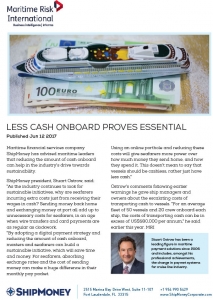Less cash onboard proves essential
Maritime financial services company ShipMoney has advised maritime leaders that reducing the amount of cash onboard can help in the industry’s drive towards sustainability.
ShipMoney President, Stuart Ostrow said: “As the industry continues to look for sustainable initiatives, why are seafarers incurring extra costs just from receiving their wages in cash? Sending money back home and exchanging money at port all add up to unnecessary costs for seafarers, in an age when wire transfers and card payments are as regular as clockwork.
“By adopting a digital payment strategy and reducing the amount of cash onboard, masters and seafarers can build a sustainable initiative, which will save time and money. For seafarers, absorbing exchange rates and the cost of sending money can make a huge difference in their monthly pay packet.
Using an online porthole and reducing these costs will give seafarers more power over how much money they send home, and how they spend it. This doesn’t mean to say that vessels should be cashless, rather just have less cash.”
Ostrow’s comments following earlier warnings he gave ship managers and owners about the escalating costs of transporting cash to vessels. “For an average fleet of 50 vessels and 20 crew onboard each ship, the cost of transporting cash can be in excess of US $580,000 per annum,” he said earlier this year.


